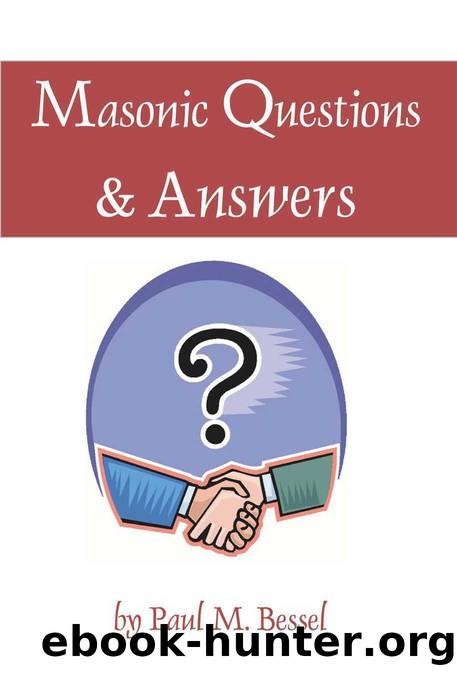Masonic Questions and Answers by Bessel Paul M

Author:Bessel, Paul M. [Bessel, Paul M.]
Language: eng
Format: epub
Publisher: Unknown
Published: 2009-10-18T16:00:00+00:00
Appendixes
Appendix A
âDefinitionsâ of Freemasonry
There is no single, âofficialâ definition of Freemasonry. In fact, there is no single or âofficialâ leader or ruling body of Freemasonry. In the United States, in each state there are one or more Grand Lodges, each of which can define Freemasonry any way it wishes, and the same is true in most countries in the world. Many Grand Lodges do not even define Freemasonry, but allow each of their members to define Freemasonry any way they wish.
Here is a definition of Freemasonry that I think is appropriate:
Freemasonry is an organization whose goals include:
1. Helping its members improve themselves through education and improved knowledge of themselves and others.
2. Brotherhood of all people and tolerance of differences among people.
3. Support of democracy, freedom, individual rights, and the dignity of all people.
4. Mutual assistance, including helping fellow membersâ families.
5. Charity and assistance to the community, especially those in need.
Some Masonic writers and researchers have written their own definitions of Freemasonry.
William Preston said Freemasonryâs role is spreading knowledge. Masons should study and learn more about all subjects. Another idea is that Freemasonryâs purpose is the perfection of humanity by organizing the moral sentiments of mankind, improving law and government. George Oliver felt Freemasonry is best understood in relation to the philosophy of religion, as a means for us to know God and his works, by handing down tradition. Albert Pike said that Freemasonry is a method of studying basic principles and its goal is to reveal and give us possession of the universal principle by which we may master the universe, the Absolute. We should study the allegories and symbols of Freemasonry until they reveal the light to each of us individually.
Roscoe Pound and others in the early 1900âs talked about a modern approach, that Freemasonryâs goal is to preserve, develop, and transmit to posterity the civilization passed on to us, by insisting on the universality of mankind and the transmission of an immemorial tradition of human solidarity. William E. Hammond talked of moral discipline, where Masonry produces the finest type of character and culture through fellowship and mutual helpfulness. Joseph Fort Newton said Freemasonry is a form of public service and public mindedness. We have a social duty to help our neighbors by work in our communities, to promote the freedoms of the mind unhampered by dictation by anyone, with education for all to maintain democracy, and to unite people in common service for mankind.
Allen E. Roberts and Albert Mackey said Masonry is a system of ethics and brotherhood, making men better not just to themselves but to each other. It teaches the meaning of life and death, with the search for the lost word, the attempt to find Godâs truth in our lives. We should act towards others as we want them to act towards us, with faith in the social, eternal, and intellectual progress of mankind.
Arthur E. Waite and W.L. Wilmshurst wrote about Masonry as essentially a spiritual activity. Waite described it as the mysticism of a first-hand experience with God, with symbols for those who are not yet capable of understanding.
Download
This site does not store any files on its server. We only index and link to content provided by other sites. Please contact the content providers to delete copyright contents if any and email us, we'll remove relevant links or contents immediately.
| Baha'i | Cults |
| Demonology & Satanism | Eckankar |
| Egyptian Book of the Dead | Freemasonry |
| Messianic Judaism | Mysticism |
| Scientology | Theism |
| Tribal & Ethnic | Unitarian Universalism |
The Four Agreements by Don Miguel Ruiz(5510)
Breaking Free by Rachel Jeffs(3621)
The Hatha Yoga Pradipika (Translated) by Svatmarama(2481)
120 Days of Sodom by Marquis de Sade(2434)
Member of the Family by Dianne Lake(2018)
The Tao of Physics by Fritjof Capra(1846)
The Psychedelic Gospels: The Secret History of Hallucinogens in Christianity by Jerry B. Brown(1825)
The Road to Jonestown by Jeff Guinn(1743)
Uriel's Machine by Christopher Knight(1621)
Going Clear by Lawrence Wright(1571)
Going Clear: Scientology, Hollywood, and the Prison of Belief by Lawrence Wright(1569)
The Grand Grimoire: The Red Dragon by Author Unknown(1414)
The Gnostic Gospel of St. Thomas by Tau Malachi(1411)
Key to the Sacred Pattern: The Untold Story of Rennes-le-Chateau by Henry Lincoln(1350)
The Malloreon: Book 02 - King of the Murgos by David Eddings(1307)
Waco by David Thibodeau & Leon Whiteson & Aviva Layton(1293)
The New World Order Book by Nick Redfern(1255)
The Secret of the Temple by John Michael Greer(1216)
The Initiatory Path in Fairy Tales by Bernard Roger(1177)
